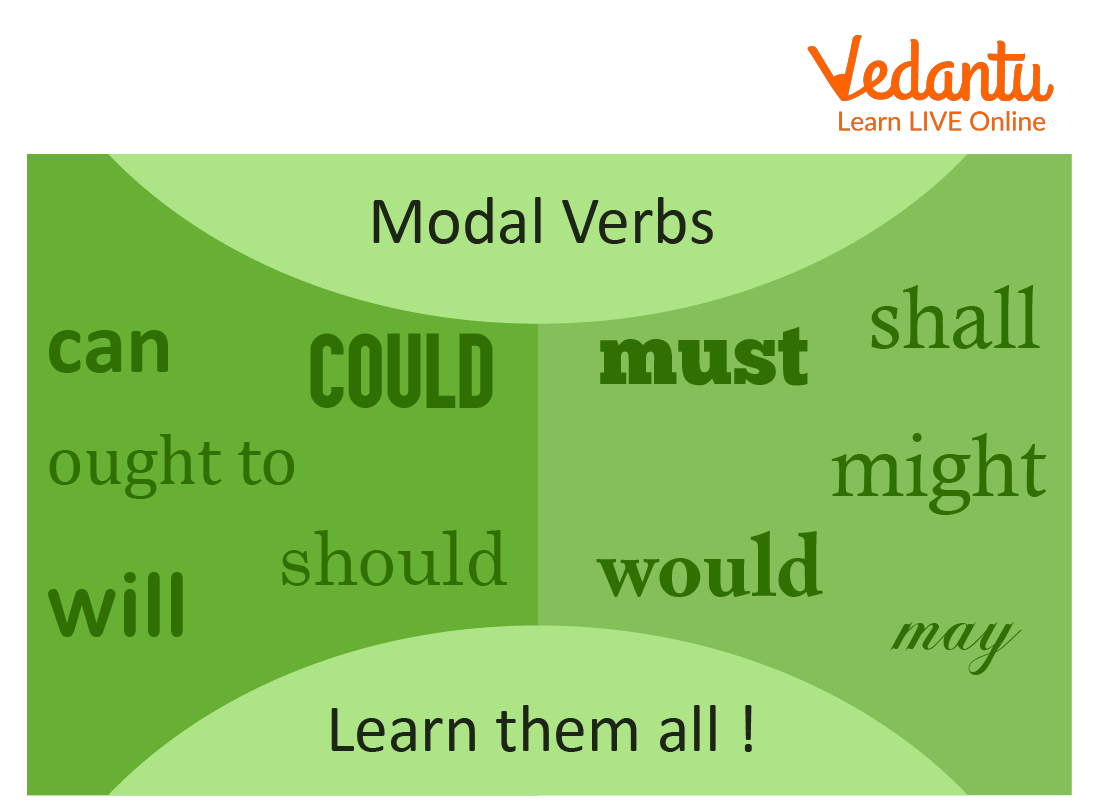




Key Modal Verbs Explained with Real-Life Examples
There are different types of verbs that we regularly use. But which verbs do you use when asking for permission or while requesting something? The answer is modal verbs. Modal verbs are a set of verbs that are used whenever we need to make a request or ask permission to do something. In this article, we will learn about these modal verbs and discuss them in detail. We will also go through a few examples to get a better understanding of the uses of modals in English language.

Modal verbs in English
List of Some of the Modal Verbs in the English Language
The following is a list of commonly used modal verbs in English:
Can - This verb is used for expressing possibility, ability, to make a request, or to ask for permission. The negative form of this verb is ‘cannot’ or ‘can’t’.
Examples:
Can you do me a favour?
Can I go to the cinema?
Can’t I take a leave?
We can arrange for a stereo if you need one.
Could - This verb is used to express ability or possibility in a sentence, in the past. The negative form of this verb is ‘could not’ or ‘couldn’t’.
Examples:
Could you pass me the bottle?
I couldn’t walk for a week after the accident.
I could drive to drop you home.
May - It is used to ask permission in the present or to talk about possibilities. The negative of this verb is ‘may not’.
Examples:
May I go to the church tomorrow?
May I come along with you?
You may not visit the graveyard at night.
Might - This is the past tense of ‘may’ and is used in a similar context. ‘Might’ is often used to express past hypothetical situations or conditions. However, it is also used to express possibility or permission in the present or the future. The negative of this verb is ‘might not’.
Examples:
The game might have been cancelled due to rain.
You might find him at the mall.
I might not be able to visit you this summer.
Will - This verb is generally used to make the future forms of verbs in the English language. The negative of this verb is ‘will not’ or ‘won’t’.
Examples:
I will come to the party in the evening.
He will not be available for a call after 11 p.m.
Would - This is the past form of will and is used to communicate intentions and ask for permissions in a more polite way. The negative of this verb is ‘would not’ or ‘wouldn’t’.
Examples:
Would you be interested in a game of chess?
I would not make that choice if given an option.
Wouldn’t you want to be there tomorrow?
Shall - This modal verb is more common in British English than American English. It is used to communicate offers, options, and intentions. The negative for this verb is ‘shall not’.
Examples:
You shall not pass this gate.
I shall make you an offer.
Should - This verb is mostly used to give advice and suggestions. The negative for this verb is ‘should not’ or ‘shouldn’t’.
Examples:
We should stick together to get through this problem.
You should not go there alone at night.
Ought to - This verb is similar to should, but it is not used as much. It is used to communicate advice. The negative of this verb is ‘ought not to’.
Examples:
You ought to be careful while you drive in the rain.
You ought not to worry about such problems as of now.
Must - This is the best verb to communicate necessity or urgency. The negative of the verb is ‘must not’ or ‘mustn’t’.
Examples:
I must leave immediately.
Must you do this right now?
We must hurry or we might miss the train.
Conclusion
Modals are important to the English language and they must be learnt properly and a student must be able to use them appropriately when need be. They are easily used many times in daily conversations, and we often use them subconsciously. But it is also important to know what they are and how to use them properly.
FAQs on Uses of Modals in English: Complete Student Guide
1. What are some examples of the use of the modal verb ‘must’?
Some examples of the modal verb ‘must’ could be as per the following sentences:
You must go home immediately or your mother will be very angry.
He must be very tired after the long journey from home.
We must make sure no dirt is left on the floor when the babies are there to play.
Must you be so rude when you address someone for any issue?
The prisoners must have escaped through the tunnel way at night.
2. Give a few examples of the modal verb ‘couldn’t’ in sentences.
The following sentences are perfect examples of the modal verb ‘couldn’t’:
Couldn’t you reach the venue before time for once, Richard?
Couldn’t the dates be rescheduled in case of an emergency?
You couldn’t move that huge chunk of rock even if you wanted to.
They couldn’t score a single goal against the opponent team throughout the entire match.
The teacher couldn’t find any mistakes at all in Alex’s project this year!















